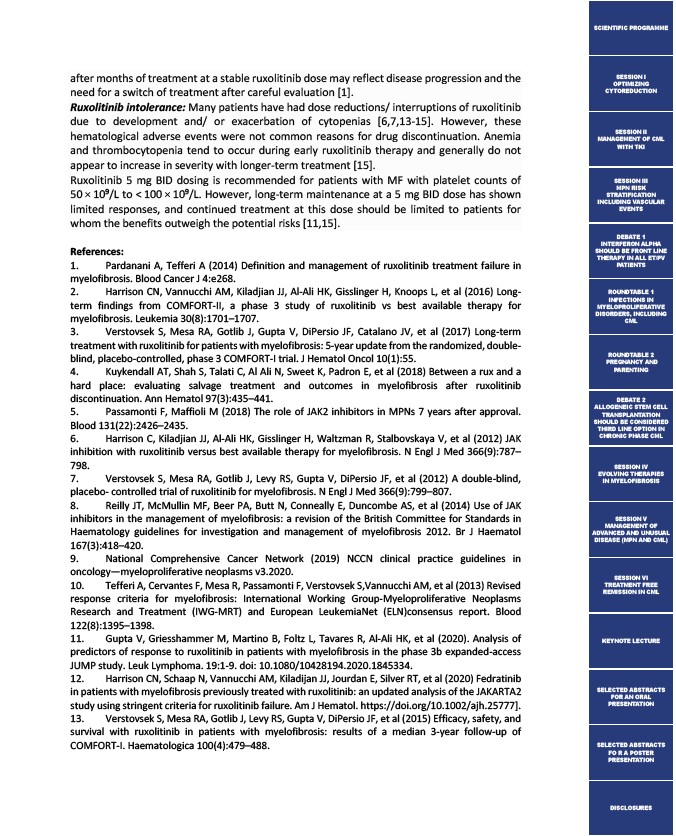
after months of treatment at a stable ruxolitinib dose may reflect disease progression and the
need for a switch of treatment after careful evaluation 1.
Ruxolitinib intolerance: Many patients have had dose reductions/ interruptions of ruxolitinib
due to development and/ or exacerbation of cytopenias 6,7,13-15. However, these
hematological adverse events were not common reasons for drug discontinuation. Anemia
and thrombocytopenia tend to occur during early ruxolitinib therapy and generally do not
appear to increase in severity with longer-term treatment 15.
Ruxolitinib 5 mg BID dosing is recommended for patients with MF with platelet counts of
50 × 109/L to < 100 × 109/L. However, long-term maintenance at a 5 mg BID dose has shown
limited responses, and continued treatment at this dose should be limited to patients for
whom the benefits outweigh the potential risks 11,15.
References:
1. Pardanani A, Tefferi A (2014) Definition and management of ruxolitinib treatment failure in
myelofibrosis. Blood Cancer J 4:e268.
2. Harrison CN, Vannucchi AM, Kiladjian JJ, Al-Ali HK, Gisslinger H, Knoops L, et al (2016) Long-term
findings from COMFORT-II, a phase 3 study of ruxolitinib vs best available therapy for
myelofibrosis. Leukemia 30(8):1701–1707.
3. Verstovsek S, Mesa RA, Gotlib J, Gupta V, DiPersio JF, Catalano JV, et al (2017) Long-term
treatment with ruxolitinib for patients with myelofibrosis: 5-year update from the randomized, double-blind,
placebo-controlled, phase 3 COMFORT-I trial. J Hematol Oncol 10(1):55.
4. Kuykendall AT, Shah S, Talati C, Al Ali N, Sweet K, Padron E, et al (2018) Between a rux and a
hard place: evaluating salvage treatment and outcomes in myelofibrosis after ruxolitinib
discontinuation. Ann Hematol 97(3):435–441.
5. Passamonti F, Maffioli M (2018) The role of JAK2 inhibitors in MPNs 7 years after approval.
Blood 131(22):2426–2435.
6. Harrison C, Kiladjian JJ, Al-Ali HK, Gisslinger H, Waltzman R, Stalbovskaya V, et al (2012) JAK
inhibition with ruxolitinib versus best available therapy for myelofibrosis. N Engl J Med 366(9):787–
798.
7. Verstovsek S, Mesa RA, Gotlib J, Levy RS, Gupta V, DiPersio JF, et al (2012) A double-blind,
placebo- controlled trial of ruxolitinib for myelofibrosis. N Engl J Med 366(9):799–807.
8. Reilly JT, McMullin MF, Beer PA, Butt N, Conneally E, Duncombe AS, et al (2014) Use of JAK
inhibitors in the management of myelofibrosis: a revision of the British Committee for Standards in
Haematology guidelines for investigation and management of myelofibrosis 2012. Br J Haematol
167(3):418–420.
9. National Comprehensive Cancer Network (2019) NCCN clinical practice guidelines in
oncology—myeloproliferative neoplasms v3.2020.
10. Tefferi A, Cervantes F, Mesa R, Passamonti F, Verstovsek S,Vannucchi AM, et al (2013) Revised
response criteria for myelofibrosis: International Working Group-Myeloproliferative Neoplasms
Research and Treatment (IWG-MRT) and European LeukemiaNet (ELN)consensus report. Blood
122(8):1395–1398.
11. Gupta V, Griesshammer M, Martino B, Foltz L, Tavares R, Al-Ali HK, et al (2020). Analysis of
predictors of response to ruxolitinib in patients with myelofibrosis in the phase 3b expanded-access
JUMP study. Leuk Lymphoma. 19:1-9. doi: 10.1080/10428194.2020.1845334.
12. Harrison CN, Schaap N, Vannucchi AM, Kiladijan JJ, Jourdan E, Silver RT, et al (2020) Fedratinib
in patients with myelofibrosis previously treated with ruxolitinib: an updated analysis of the JAKARTA2
study using stringent criteria for ruxolitinib failure. Am J Hematol. https://doi.org/10.1002/ajh.25777.
13. Verstovsek S, Mesa RA, Gotlib J, Levy RS, Gupta V, DiPersio JF, et al (2015) Efficacy, safety, and
survival with ruxolitinib in patients with myelofibrosis: results of a median 3-year follow-up of
COMFORT-I. Haematologica 100(4):479–488.
SCIENTIFIC PROGRAMME
SESSION I
OPTIMIZING
CYTOREDUCTION
SESSION II
MANAGEMENT OF CML
WITH TKI
SESSION III
MPN RISK
STRATIFICATION
INCLUDING VASCULAR
EVENTS
DEBATE 1
INTERFERON ALPHA
SHOULD BE FRONT LINE
THERAPY IN ALL ET/PV
PATIENTS
ROUNDTABLE 1
INFECTIONS IN
MYELOPROLIFERATIVE
DISORDERS, INCLUDING
CML
ROUNDTABLE 2
PREGNANCY AND
PARENTING
DEBATE 2
ALLOGENEIC STEM CELL
TRANSPLANTATION
SHOULD BE CONSIDERED
THIRD LINE OPTION IN
CHRONIC PHASE CML
SESSION IV
EVOLVING THERAPIES
IN MYELOFIBROSIS
SESSION V
MANAGEMENT OF
ADVANCED AND UNUSUAL
DISEASE (MPN AND CML)
SESSION VI
TREATMENT FREE
REMISSION IN CML
KEYNOTE LECTURE
SELECTED ABSTRACTS
FOR AN ORAL
PRESENTATION
SELECTED ABSTRACTS
FO R A POSTER
PRESENTATION
DISCLOSURES